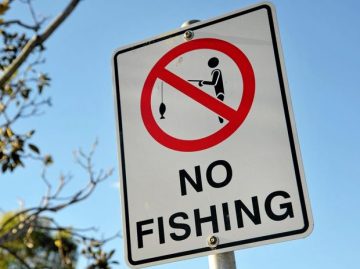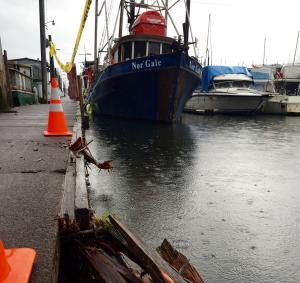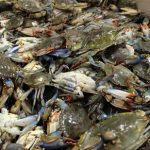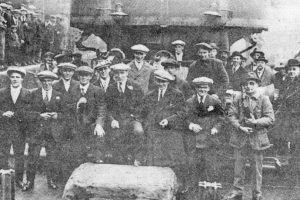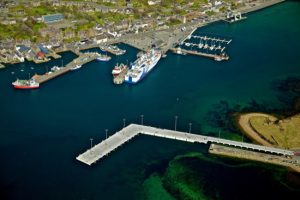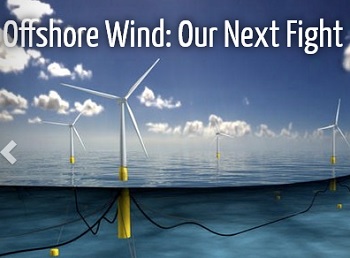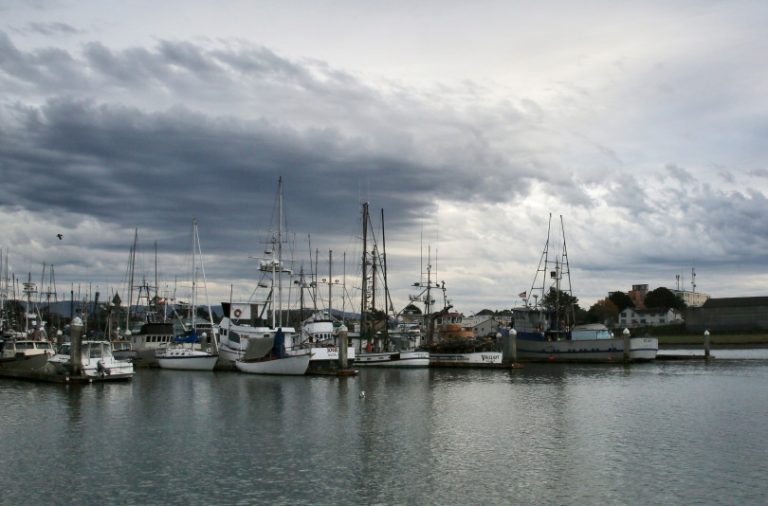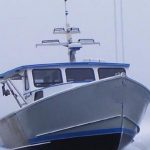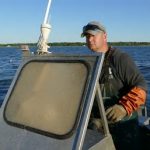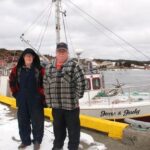Daily Archives: September 7, 2016
Newfoundland fishing tragedy claims members from three generations of St. John’s family
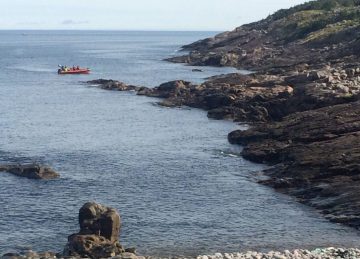 Former NHLer Terry Ryan laughed through tears Wednesday, recalling how playing ball hockey with fishermen now lost off Newfoundland made him feel like the superstar he might have been. “I remember the first game, I got player of the game and they handed me a lobster,” said the 1995 first-round draft pick for the Montreal Canadiens. “They just loved the water. They loved fishing. They loved everything about it.” Ryan, who grew up in Mount Pearl, N.L., played ball hockey the last three years with commercial fisherman Keith Walsh and his buddy, Billy Humby. Both men, along with Keith’s son, Keith Walsh Jr., and his father Eugene Walsh were on board an open, seven-metre boat reported overdue Tuesday night before two bodies were recovered near St. John’s. Read this sad story here 20:13
Former NHLer Terry Ryan laughed through tears Wednesday, recalling how playing ball hockey with fishermen now lost off Newfoundland made him feel like the superstar he might have been. “I remember the first game, I got player of the game and they handed me a lobster,” said the 1995 first-round draft pick for the Montreal Canadiens. “They just loved the water. They loved fishing. They loved everything about it.” Ryan, who grew up in Mount Pearl, N.L., played ball hockey the last three years with commercial fisherman Keith Walsh and his buddy, Billy Humby. Both men, along with Keith’s son, Keith Walsh Jr., and his father Eugene Walsh were on board an open, seven-metre boat reported overdue Tuesday night before two bodies were recovered near St. John’s. Read this sad story here 20:13
Scientist blames fishing gear for fewer right whale births
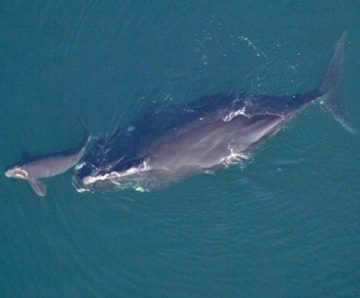 A study recently published in the journal Frontiers in Marine Science says that, despite efforts by fishermen and federal fisheries management authorities, more right whales than ever are getting tangled up in fishing gear. The study also states that injuries and deaths from those incidents “may be overwhelming recovery efforts” for the endangered right whale population. In the report published in July, lead author Scott Kraus, a whale researcher at the New England Aquarium in Boston, says that while the population of whales has increased from fewer than 300 in 1992 to about 500 in 2015, births of right whales have declined by 40 percent since 2010. Read the rest here 18:34
A study recently published in the journal Frontiers in Marine Science says that, despite efforts by fishermen and federal fisheries management authorities, more right whales than ever are getting tangled up in fishing gear. The study also states that injuries and deaths from those incidents “may be overwhelming recovery efforts” for the endangered right whale population. In the report published in July, lead author Scott Kraus, a whale researcher at the New England Aquarium in Boston, says that while the population of whales has increased from fewer than 300 in 1992 to about 500 in 2015, births of right whales have declined by 40 percent since 2010. Read the rest here 18:34
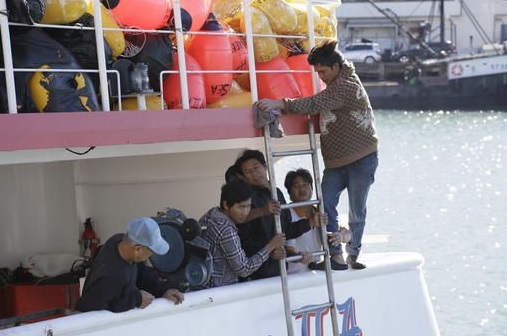
Foreign fishermen confined to boats catch Hawaiian seafood
Hawaii’s high-quality seafood is sold with the promise that it’s caught by local, hard-working fishermen. But the people who haul in the prized catch are almost all undocumented foreign workers, confined to American boats for years at a time without basic rights or protections. About 700 men from impoverished Southeast Asian and Pacific Island nations make up the bulk of the workforce in this unique U.S. fishing fleet. A federal loophole allows them to take the dangerous jobs without proper work permits, just as long as they don’t set foot on shore. Americans buying Hawaiian seafood are almost certainly eating fish caught by one of these workers. A six-month Associated Press investigation found fishing crews living in squalor on some boats, forced to use buckets instead of toilets and suffering running sores from bed bugs. There have been instances of human trafficking, active tuberculosis and low food supplies. (I’m having a very hard time wrapping my head around this.) Read the story here 15:50
FWC nabs lobster poaching brothers in the Card Sound Lobster Sanctuary
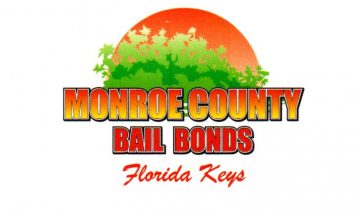 Two commercial fishermen — brothers from Homestead — with a history of fisheries violations were nabbed by state wildlife officers Sunday afternoon poaching lobster in the Card Sound Lobster Sanctuary. And after this incident, the Florida Fish and Wildlife Conservation Commission may keep their boat, said FWC spokesman Bobby Dube. The case began on Saturday when officers spotted the 17-foot bully net-style boat suspiciously in deep water, said FWC Capt. David Dipre. That spurred an undercover investigation, Dube said. On Sunday, officers watched the boat near Little Angelfish Creek in North Key Largo and saw Javier Morales-Molina, 39, diving in the water, Dube said. His brother, Alfredo Morales-Molina, 41, was in the boat. Those officers called for a marked patrol boat to stop the brothers, Dube said. Read the story here 14:05
Two commercial fishermen — brothers from Homestead — with a history of fisheries violations were nabbed by state wildlife officers Sunday afternoon poaching lobster in the Card Sound Lobster Sanctuary. And after this incident, the Florida Fish and Wildlife Conservation Commission may keep their boat, said FWC spokesman Bobby Dube. The case began on Saturday when officers spotted the 17-foot bully net-style boat suspiciously in deep water, said FWC Capt. David Dipre. That spurred an undercover investigation, Dube said. On Sunday, officers watched the boat near Little Angelfish Creek in North Key Largo and saw Javier Morales-Molina, 39, diving in the water, Dube said. His brother, Alfredo Morales-Molina, 41, was in the boat. Those officers called for a marked patrol boat to stop the brothers, Dube said. Read the story here 14:05
Athearn Marine Agency Boat of the Week: 49′ Novi Lobster/Gillnetter Split Wheelhouse – CAT 3306
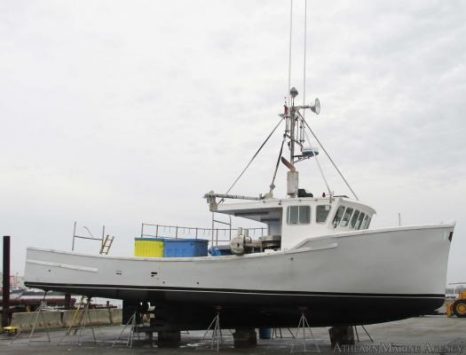 Specifications, information and 26 photo’s click here To see all the boats in this series, Click here 13:30
Specifications, information and 26 photo’s click here To see all the boats in this series, Click here 13:30
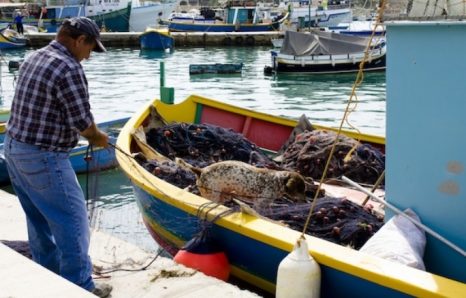
Powerless spectators to the hungry tuna ranchers: the demise of artisanal fishermen
Artisanal fishermen in Malta have become ‘powerless spectators’ to the way the Bluefin tuna fishery industry has been taken over by the large purse seiners and foreign interests in tuna ranching. A long-standing tradition of small-scale fishers that existed since the 1700s, which used hook-and-line methods baited with mackerel, has now given way to the tuna giants, intensive technology and their tuna fattening ranches, commanding prices that can only force small fishers out of business. But this rapid transformation into industrialised fishing was also carried out with the direct blessing of the government in 2001, and since then, the tuna ranching industry has suffocated artisanal fishers. In a field study carried out by the Durrell Institute of Conservation and Ecology at the University of Kent, social scientists met with Maltese fishermen whose livelihoods were irrevocably changed by the advent of industrialised tuna fishing. Read the story here 11:43
Canadians don’t grasp the dire straits the Coast Guard Fleet is in, expert says
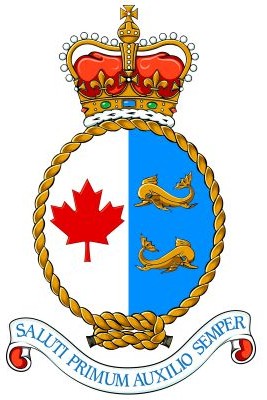 The majority of the Canadian Coast Guard fleet is so old that its book value is almost worthless, says an independent report presented to the Liberal government. A third-party analysis was commissioned by the agency, which has for the last 20 years fallen under the responsibility of the Fisheries Department. A heavily censored copy of the report, which was included in a briefing package for former fisheries minister Hunter Tootoo, was obtained by CBC News under the Access to Information Act. It pulls no punches when it comes to the state of the fleet that performs vital ice-breaking and life-saving search and rescue functions on all three coasts. “A significant amount of the fleet is fully depreciated,” says the undated report written by analysts Bill Austin and Carl Hegge. Read the story here 10:04
The majority of the Canadian Coast Guard fleet is so old that its book value is almost worthless, says an independent report presented to the Liberal government. A third-party analysis was commissioned by the agency, which has for the last 20 years fallen under the responsibility of the Fisheries Department. A heavily censored copy of the report, which was included in a briefing package for former fisheries minister Hunter Tootoo, was obtained by CBC News under the Access to Information Act. It pulls no punches when it comes to the state of the fleet that performs vital ice-breaking and life-saving search and rescue functions on all three coasts. “A significant amount of the fleet is fully depreciated,” says the undated report written by analysts Bill Austin and Carl Hegge. Read the story here 10:04
NOAA: Successful conservation efforts pay off for humpback whales
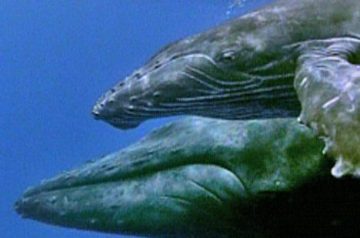 Endangered humpback whales in nine of 14 newly identified distinct population segments have recovered enough that they don’t warrant listing under the Endangered Species Act, NOAA Fisheries said today. International conservation efforts to protect and conserve whales over the past 40 years proved successful for most populations. Four of the distinct population segments are still protected as endangered, and one is now listed as threatened. “Today’s news is a true ecological success story,” said Eileen Sobeck, assistant NOAA administrator for fisheries. “Whales, including the humpback, serve an important role in our marine environment. Separately managing humpback whale populations that are largely independent of each other allows us to tailor conservation approaches for each population.” Read the rest here Read the press release here with links 09:15
Endangered humpback whales in nine of 14 newly identified distinct population segments have recovered enough that they don’t warrant listing under the Endangered Species Act, NOAA Fisheries said today. International conservation efforts to protect and conserve whales over the past 40 years proved successful for most populations. Four of the distinct population segments are still protected as endangered, and one is now listed as threatened. “Today’s news is a true ecological success story,” said Eileen Sobeck, assistant NOAA administrator for fisheries. “Whales, including the humpback, serve an important role in our marine environment. Separately managing humpback whale populations that are largely independent of each other allows us to tailor conservation approaches for each population.” Read the rest here Read the press release here with links 09:15
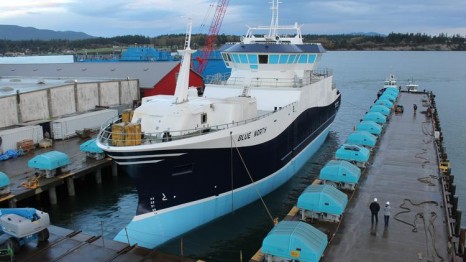
Blue North Fisheries debuts state-of-the-art commercial fishing vessel
The F/V Blue North is a 191 foot freezer longliner owned by Seattle based Blue North Fisheries. The vessel was designed in Norway and built by Dakota Creek Industries in Anacortes. “I’m kind of pinching myself – we are finally here – we’ve got it,” said Patrick Burns who is the co-founder of Blue North. “It’s a state of the art vessel.” The $36 million fishing boat has been under construction for several years. It was delivered last week and has been receiving some final touches at Seattle’s Pier 91 as it prepares to make fishing history in Alaska’s Bering Sea. “This vessel is a game changer – it’s the greenest, most sustainable and highest tech commercial fishing vessel that’s ever been built in the United State and possibly the world,” said Kenny Down, President and CEO of Blue North Fisheries. Video, Read the story here 01:11
NOAA and Sea Grant fund $800,000 in research to understand effects of ocean changes on iconic Northeast marine life
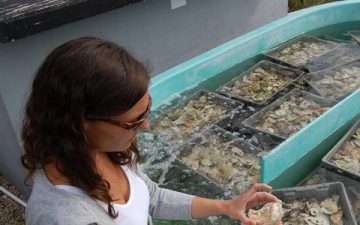 NOAA’s Ocean Acidification Program (OAP) and the Northeast Sea Grant Programs joined together to prioritize and fund new research on how ocean acidification is affecting marine life including lobsters, clams, oysters, mussels and sand lance that are so important to the Northeast region. Funding includes $800,000 in federal funds from the two programs with an additional $400,000 non-federal match. NOAA and Sea Grant drew on the work of the Northeast Coastal Acidification Network to set these priorities. The Network is made up of concerned fishermen, scientists, resource managers, and representatives from federal and state agencies who work together to identify critical vulnerabilities in the northeast, including regionally important and economically significant marine resources that are vital to the many livelihoods and the culture of New England. Read the rest here 00:23
NOAA’s Ocean Acidification Program (OAP) and the Northeast Sea Grant Programs joined together to prioritize and fund new research on how ocean acidification is affecting marine life including lobsters, clams, oysters, mussels and sand lance that are so important to the Northeast region. Funding includes $800,000 in federal funds from the two programs with an additional $400,000 non-federal match. NOAA and Sea Grant drew on the work of the Northeast Coastal Acidification Network to set these priorities. The Network is made up of concerned fishermen, scientists, resource managers, and representatives from federal and state agencies who work together to identify critical vulnerabilities in the northeast, including regionally important and economically significant marine resources that are vital to the many livelihoods and the culture of New England. Read the rest here 00:23






